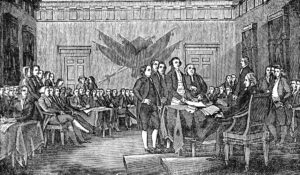Congress’ Mandates Execution
Congress can appoint a dedicated group to fulfill money-related mandates as per the Constitution.
Currently, the Secretary of the Treasury executes tasks designated by Congress, like overseeing the stabilization fund.
Interpreting Congressional Appointments
Appointments made by Congress signify a collective decision, not a fraction.
The responsibility to coin money and regulate its value should thus stem from the unified Congress.
Board of Governors Appointments
The President appoints and the Senate confirms the Governors of the Federal Reserve Board under the Banking Act of 1935.
Correcting Misconceptions
(a) While the President appoints, only the Senate confirms, excluding the collective voice of Congress. The mandate over money resides with both houses, not just the Senate.
(b) No clear mandate or specified duties are outlined for the Federal Reserve Board, negating honest price level establishment.
(c) The Federal Reserve Banks operate solely for private profit, not for public welfare.
(d) The Federal Government doesn’t cover the salaries of the Board Governors; they oversee profit-centric corporations.
Ideal Board Structure
A “Congressional Board of Money” composed of about nine individuals aligns with the Constitution’s money-related provisions.
Qualifications of Board Members
(a) Unquestioned Integrity: Demonstrated honesty and impeccable integrity are paramount.
(b) Absence of Financial Affiliations: No affiliations with international loan underwriters or speculative businesses.
(c) Educational and Business Experience: Profound education and practical business acumen vital for comprehensive economic analysis.
Congress selects admirals based on naval expertise, not painters or blacksmiths.
Similarly, appointees to the Congressional Money Board must possess requisite qualifications—education, experience, and character—to safeguard democracy.
Political Influence Concerns
Contrary to speculation, a Congressional Money Board wouldn’t succumb to political sway.
Presently, the Federal Reserve Banks operate as a shadow government, exploiting people and manipulating politicians for their gain, plunging citizens into financial victimhood.
Board Member Benefits
Board members wouldn’t benefit personally from money issuance.
They’d receive salaries solely as citizens, contributing to the money in circulation.
Money Handling by the Board
The Board wouldn’t manage or control money once it’s in use.
It’s directly paid to citizens and wouldn’t remain under the Board’s ownership or jurisdiction.
Accountability and Oversight
Should an excess or shortage of money arise, the Congressional Board of Money holds direct accountability.
Citizens can demand resolution from Congress, as the Board’s actions reflect Congress’s directives.
Transparency in Money Supply
Publicizing accurate, straightforward money figures weekly in major newspapers is vital.
This transparency ensures citizens—regardless of financial expertise—can comprehend the money’s status, shielding them from excesses or shortages.
Accountability in Money Control
Presently, only well-informed individuals, adept at deciphering cryptic statements, know the hidden figures and personalities controlling the nation’s financial destiny.
Non-partisanship and Independence
The Congressional Money Board must remain apolitical and independent.
Board members should have no political affiliations, no voting rights, and should distance themselves personally from business activities.
Upholding Democratic Financial Governance
Reinstating Congress’s authority in money regulation aligns with constitutional mandates and safeguards against manipulative private interests.
A Congressional Board of Money, transparent and devoid of political inclinations, would secure financial integrity.
By prioritizing transparency, accountability, and non-partisanship, the nation paves the way for an equitable financial landscape overseen by a responsible and unbiased governing body.

